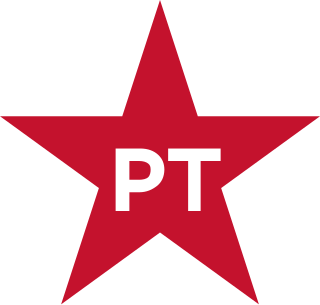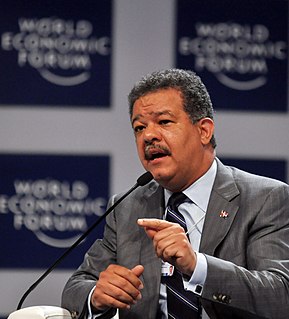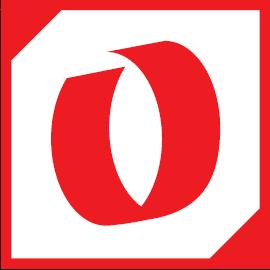
The Workers' Party is a democratic socialist political party in Brazil. Launched in 1980, it is one of the largest movements of Latin America. PT governed at the federal level in a coalition government with several other parties from 1 January 2003 to 31 August 2016. After the 2002 parliamentary election, PT became the largest party in the Chamber of Deputies and the largest in the Federal Senate for the first time ever. With the highest approval rating in the history of the country, President Luiz Inácio Lula da Silva is PT's most prominent member. His successor Dilma Rousseff, also a member of PT, took office on 1 January 2011.

The National Advancement Party is a conservative political party in Guatemala. It was founded in 1989.

The Ecological Green Party of Mexico is a green-conservative political party in Mexico. In the 2012 Legislative elections, the party took 34 seats in the Chamber of Deputies and nine seats in the Senate. During the 2012 Presidential election, PVEM supported Enrique Peña Nieto (EPN), the candidate from the Institutional Revolutionary Party (PRI), who was elected. In 2018, PVEM supported Todos por México Everyone for Mexico coalition, along with PRI and Panal. José Antonio Meade, the coalition's candidate, came in third in a four-way race, with 16.43% of the vote.

Leonel Antonio Fernández Reyna is a Dominican lawyer, academic, and was President of the Dominican Republic from 1996 to 2000 and from 2004 to 2012. Since January 2016, he is the President of the EU–LAC Foundation.

The Popular Action is a political party in Peru.

The Brazilian Socialist Party is a political party in Brazil. It was founded in 1947, before being abolished by the military regime in 1965 and re-organised in 1985 with the re-democratisation of Brazil. It elected six Governors in 2010, becoming the second largest party in number of state governments, behind only PSDB. In addition to that, it won 34 seats in the Chamber of Deputies and three seats in the Senate, besides having been a member of the For Brazil to Keep on Changing coalition, which elected Dilma Rousseff as President of Brazil.

The Humanist Party is a progressive left-wing political party in Chile, founded in 1984.

The Costa Rican Renewal Party is a Christian political party in Costa Rica.
The National Encounter Party is a political party in Paraguay.

The National Union Party is the name of several liberal conservative parties in Costa Rica, generally located right-to-center in the political spectrum.

The Broad Front is a left-wing political party in Costa Rica, the main component of the front is the Alternative of the Lefts Movement. They are defined by progressive, socialist, green, social justice, human rights and democratic ideas. Member of the Foro de Sao Paulo, part of the international Latin American Left Movement of democratic socialism.

The Independent Liberal Party is a Nicaraguan political party, which separated from Somoza's Nationalist Liberal Party (PLN) in 1944 and took part in the probably fraudulent election of 1947, won by Somoza's favored candidate. The PLI participated in the 1984 election, winning 9.6% of vote for President with its candidate Virgilio Godoy. In 1990 it was part of the National Opposition Union (UNO) - a broad alliance of Sandinista regime opponents - with Virgilio Godoy running as the vice-presidential candidate. UNO won the elections with 54% of the vote. The UNO alliance split in 1993, and in the 1996 elections the PLI, under the candidature of Virgilio Godoy, suffered its worst electoral debacle, receiving only 0.32% of the vote. It joined with Enrique Bolaños's PLC for the 2001 elections, and was part of Montealegre's Nicaraguan Liberal Alliance in the 2006 elections.

The Green Alliance is a Colombian political party located in the centre of the political spectrum. The party advocates social justice, electoral reform and economic sustainability.
The history of the socialist movement in Brazil is generally thought to trace back to the first half of the 19th century. There are documents evidencing the diffusion of socialist ideas since then, but these were, however, individual initiatives with no ability to form groups with actual political activism.

Peru Wins was a leftist electoral alliance in Peru formed for the 2011 general election. It was dominated by the Peruvian Nationalist Party and led by successful presidential candidate Ollanta Humala.

Presidential elections were held in Colombia on May 25, 2014. Since no candidate received 50% of the vote in the first round, a run-off between the two candidates with the most votes took place three weeks later on June 15, 2014. According to the official figures released by the National Registry office, as of May 22, 2014 32,975,158 Colombians were registered and entitled to vote in the 2014 presidential election, including 545,976 Colombians resident abroad. Incumbent president Juan Manuel Santos was allowed to run for a second consecutive term. In the first round, Santos and Óscar Iván Zuluaga of the Democratic Center were the two highest-polling candidates and were the contestants in the June 15 run-off. In the second round, Santos was re-elected president, gaining 50.95% of the vote compared with 45.00% for Zuluaga.

Miguel Octavio Vargas Maldonado is a civil engineer, businessman, and politician from the Dominican Republic. He is the chairman of the Dominican Revolutionary Party, a minority party allied with the PLD government and current Minister of Foreign Affairs.

Presidential elections were held in Colombia on 27 May 2018. As no candidate received a majority of the vote, a second round was held on 17 June. Incumbent President Juan Manuel Santos is ineligible for re-election, having already served two terms. President Iván Duque is serving a four-year term from 7 August 2018 to 7 August 2022.
The Green Party of Bolivia is a political party in Bolivia, which has a green political orientation. Founded in 2007, it participated in the 2014 general elections, in opposition to the reigning President Evo Morales and the Movement for Socialism. The party is a member of the Global Greens, an international network of green parties, and an observer of the Federation of the Green Parties of the Americas, a regional network of the same.

Fernando Vargas Mosua, more commonly referred to as Fernando Vargas, is a Bolivian indigenous leader who heads the Subcentral TIPNIS, the indigenous authority which holds title to the Isiboro Sécure National Park and Indigenous Territory. The TIPNIS indigenous community is engaged in an extended campaign against the building of the Villa Tunari–San Ignacio de Moxos Highway through the territory, a project championed by President Evo Morales. Vargas was a candidate for the Green Party in the 2014 presidential election, with the party's leader and founder Margot Soria Saravia serving as vice presidential candidate. With 24,685 out of 27,403 polling stations having reported in the Green Party had gained 126,958 votes in the presidential elections, a total of 2.79%.


















